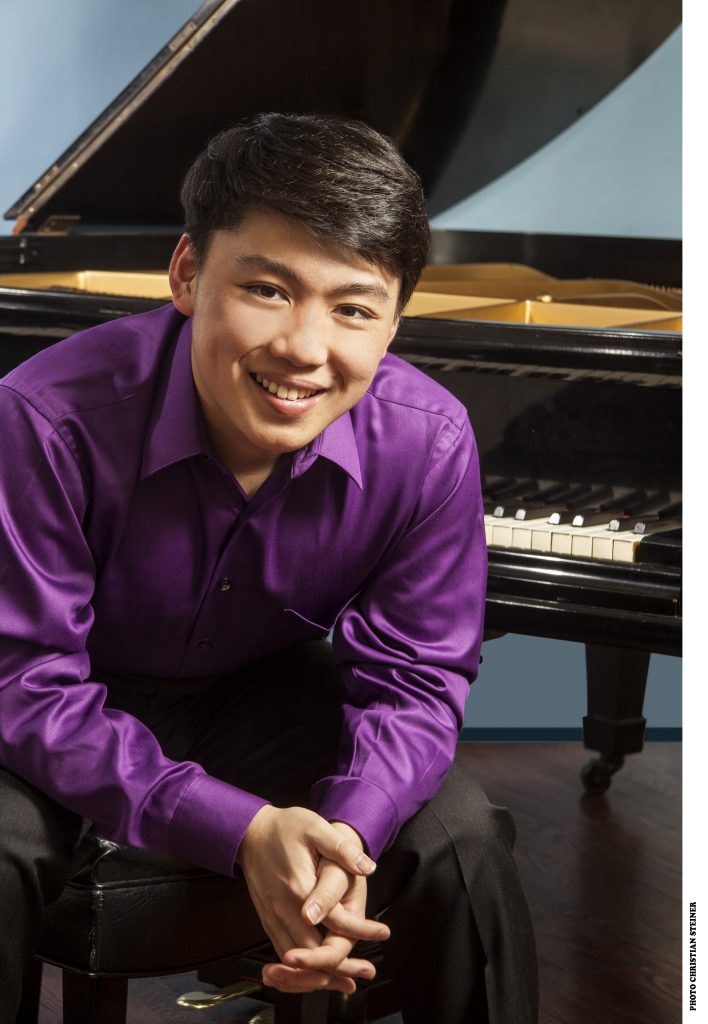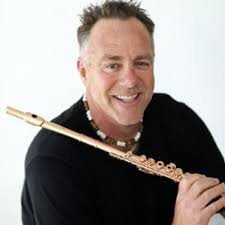A Tale of Two Orchestras

David Danzmayr [photo courtesy of the San Diego Symphony]
Friday evening’s San Diego Symphony concert at the Jacobs Music Center’s Copley Symphony Hall pitted the young Austrian conductor David Danzmayr with the even younger piano virtuoso George Li and our local champions in a display of works from Central and Eastern Europe. Pieces by Polish composer Grażyna Bacewicz (1909-1969), Chopin, and Dvořák met disparate fates in the hands of these forces.
Until this concert, Bacewicz was an entirely unknown entity to me, and the revelation of her music was refreshing and even encouraging. Her Overture, although reminiscent of Czech composer Leoš Janáček, does not sound particularly Slavic or Eastern: it is more generically Modern in tone. Earning fame initially as a violin virtuosa (a student of Carl Flesch), Bacewicz became one of Poland’s most beloved and famous composers after an accident cut her performing career short. A composition scion of Nadia Boulanger, her work is tidy, professional and handsomely put together.
This Overture could have seen the light of day as a midwestern American concert band competition piece. Sloppily executed by the players, I wondered if we were only getting the minimum, requisite effort to deliver a nearly professional sounding product. The final outcome could have been rivaled by nearly any fine conservatory or university orchestra.
The work, nonetheless, showed guest conductor Danzmayr to be an excellent, albeit somewhat fussy conductor with a plethora of hand and arm movements. It appeared that the players were the problem in the Bacewicz.
On the other hand, it seemed that the brilliance of the program’s final Dvořák was attributable to their proud excellence.
The evening’s soloist demonstrated uncanny digital perfection in his performance of Chopin’s Piano Concerto No. 1 in E minor, Op. 11. George Li has a big, impressive technique and made Danzmayr’s conductorial duties easier, playing with grace and employing rubatos that were predictable, musical and easy to follow. Li is what one might call a modern Chopin player, cut from Rubinstein and Pollini cloth, where the notes on the page are presumed to reflect the composer’s original intent.

George Li [photo (c) Christian Steiner; used by permission of the San Diego Symphony]
Pianist Li falls into this modern interpretive school and does places fidelity to the score in the fore. This is not to say that his playing is in any way devoid of expression or feeling since, on the contrary, he is a wonderfully communicative pianist. The only reservation that I had was that his sound lacked any kind of luminosity. So, was this his fault or perhaps, the hall’s?
After spending untold thousands of dollars on the former Fox Theater’s renovations since the 1980s, San Diego is still saddled with a venue that to my ears is dull and mediocre sounding. The fine acousticians and contemporary technologies incorporated in a search for the Holy Grail pursuit of creating a world-class music performance space have ultimately failed, and, in the final analysis, the old girl is still just a very dressed up movie theater. In Li’s defense, the orchestra’s own sound was also lacking in any kind of luminosity for the entire first half of the program.
But, something happened after intermission, and the second half was an entirely different affair, both musically and sonically.
The group’s performance of Dvořák’s sunny Symphony No. 8 in G Major, Op. 88, presented listeners with a gripping, inspired and altogether masterful rendition of one of the 19th Century’s great and most beloved masterpieces. Here at last was luminosity; here at last the orchestra’s impressive woodwinds and brass soared, leaving the shackles of their diffident first half playing in the dust.
What was the difference? Did the musicians feel somehow imposed upon by the Bacewicz and the Chopin with its pisher soloist? Did they perhaps feel entrapped in management’s ostensibly wily schemes to present a piece from the 20th Century against their will or by having to nurse along a young, brilliant piano soloist? I certainly hope not, but it was curious at best and disturbing at least that these same musicians who sounded utterly pedestrian during Rounds 1 and 2 of the evening finally delivered mesmerizing and transcendental playing by the final Round.
Score one for the San Diego Symphony after a lackluster first half.
Danzmayr continued to present his wares admirably in the Dvořák. Never rustling any esthetic feathers, he nonetheless delivered an interpretation that was highly profiled, keeping within all acceptable norms of style. Phrases were nicely rounded off, balances were appropriate, and the entire ensemble’s sound really came together under his direction. Especially noteworthy on this evening were the expressive and alluring solos of Principal Flute Rose Lombardo and Principal Clarinet Sheryl Renk. San Diego is fortunate to have such talents in our midst.

Yochanan Sebastian Winston, Ph.D. has performed throughout the United States, Europe and Latin America. His repertoire spans classical, jazz, klezmer, new age, contemporary, rock & roll and pop and is very active as a composer. Dr. Winston holds a Ph.D. from the UCSD, a Diplôme from the Conservatoire National de Region de Boulogne-Billancourt (France), and a Master’s and Bachelor’s of Music from the Manhattan School of Music in New York City.

Interesting review which is a very welcome departure from the weird and inexplicable Danzmayr bashing we have read before and also elsewhere. There is obviously a real chemistry between the orchestra and him and I hope that we will get to hear more of it in the future.